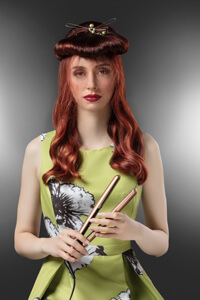These gorgeous fibers grow on our scalps and we rely on them to do one simple job: make us look prettier! So, we do shampoos, conditioners, cuts… But what about our lifestyle habits? Could they also have an impact on the general condition of our hair? Today's article will look at lifestyle habits and the contribution they can make to the quality of our hair.
This one should come as no surprise. We are what we eat ! Food is our fuel. Although food has become a social activity these days, its role is to supply our bodies with essential vitamins, minerals and nutrients to help keep us strong and healthy. Our body will always take care of our organs before providing fundamental elements to our hair, nails and skin. That's not bad news, since staying alive is more important than our hair. All that means is that we need to make sure we have enough vitamins and minerals in our diet to allow our body to allocate what our hair needs.

I wrote an article: 10 foods that promote hair growth that will help you make healthy food choices for your hair. In the meantime, don't deprive yourself of fruits, vegetables, fish and other lean proteins. Our hair is 95% protein, so don't forget to eat it with every meal. Do NOT go on a crash diet! Drastic diets are one of the main causes of hair loss in women. Reducing your body's energy reserves for long periods of time is not only unhealthy, but will not allow your body to nourish your hair enough. If you think your diet isn't giving you everything you need, invest in a good multivitamin for women.

I'll start by saying that nutrition trumps exercise for health, and it always will. Nevertheless, the benefits of regular exercise are manifold: increased life expectancy, reduced stress, weight management, and stronger muscles and bones. Is exercise good for hair too? It sure is, ladies! Exercise increases blood flow to your scalp, which helps stimulate hair growth. Plus, by reducing stress, you help keep your hair looking its best. Persistently high levels of stress can cause hair follicles to rest. These will stop growing and drop suddenly a month later. This sudden hair loss usually causes additional stress in the woman and the cycle continues. Remember that physical activity doesn't have to be strenuous to be beneficial. A walk, yoga or a short bike ride is enough to get your endorphins up and your stress levels down!
Our hair tells a story. Hair loss can be associated with other health issues that we don't know exist. Medications used to treat arthritis, high blood pressure, cancer, and even depression can all cause hair loss. Certain diseases such as lupus, thyroid disease and alopecia areata lead to hair loss and scarring. Any major hormonal change in our body can have a direct impact on our hair. This includes pregnancy, menopause and stopping birth control. Iron and ferritin deficiencies can also cause hair loss. If you notice serious changes in your hair and you haven't made any significant lifestyle changes in the past three months, it's a good idea to see your family doctor and a trichologist. A trichologist will analyze your blood for your hair problems and your doctor will look at your general health.

Hair loss can be hereditary. Hereditary hair loss, also called androgenic alopecia, is more common in men, but also occurs in women. There is no cure for androgenic alopecia, but early treatment can dramatically slow hair loss and avoid irreversible effects. The typical pattern is thinning hair on the top of the head or crown while retaining frontal hairiness. Female pattern baldness usually begins around age 30 and becomes more noticeable after menopause. By the age of 50, nearly half of women will see their hair thinning to some degree. Do any women in your family suffer from androgenic alopecia? This is an important factor to keep in mind to remedy hair loss before it gets out of control.

I saved this one for last, as it is the life factor that we have complete control over at all times. Unlike other previously mentioned circumstances, hairstyling causes physical damage to hair strands. A good starting point is to know your hair type and the particularities it entails. This Article: What's Your Hair Type, and Does It Really Matter? examines this topic in depth. Thermal devices should be used moderately or not at all. Good hygiene and natural hair products are essential for a good hair regimen. Tight hairstyles damage hair and damage hair follicles. This damage can sometimes be permanent. Bleaches and other chemicals strip away the outer layers of your hair, leaving your strands vulnerable and fragile.
Our hair says a lot about our life choices. Some hair issues are out of our control and we have to live with them. On the other hand, in most cases, it is possible to remedy these deficiencies and considerably improve the general condition of our hair.
Do you have a question about hair health? Comment below and let us know!



